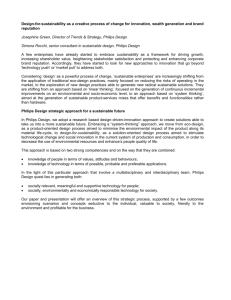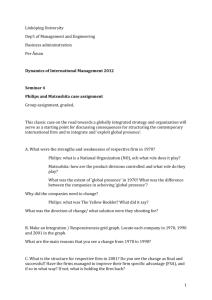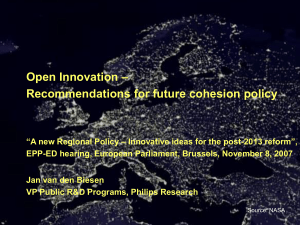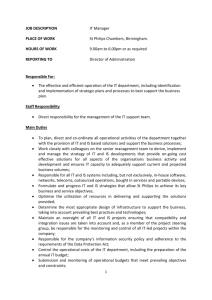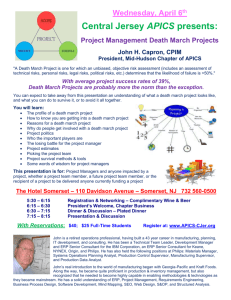Контрольная работа № 4 Прочитайте и устно переведите текст
advertisement
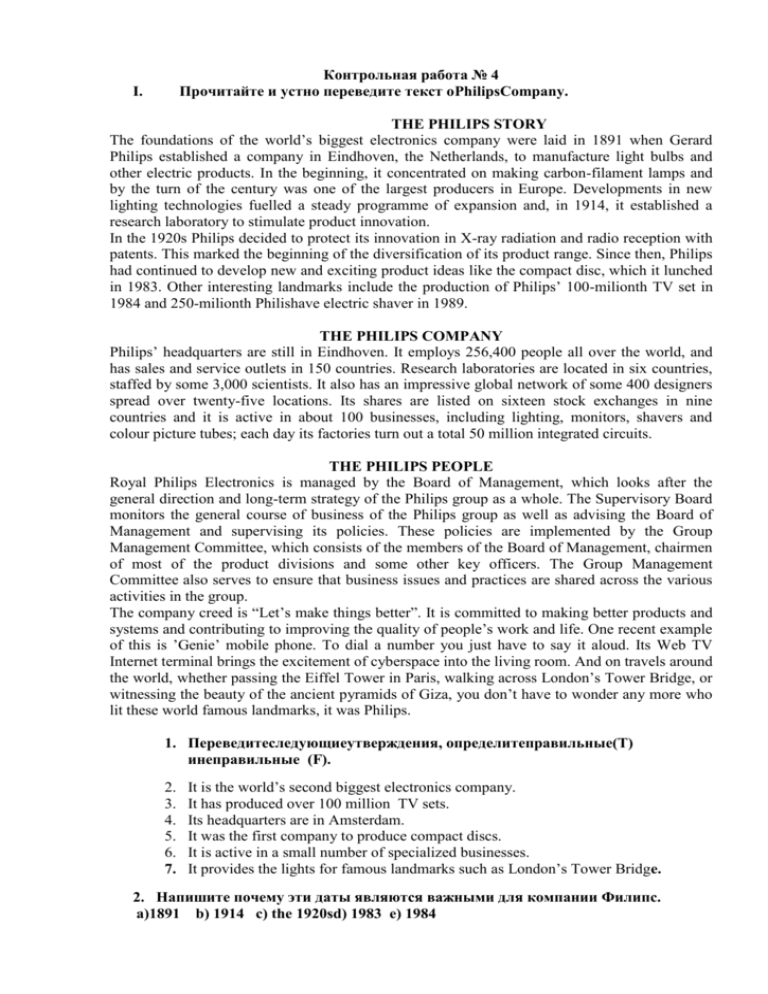
Контрольная работа № 4 Прочитайте и устно переведите текст оPhilipsCompany. I. THE PHILIPS STORY The foundations of the world’s biggest electronics company were laid in 1891 when Gerard Philips established a company in Eindhoven, the Netherlands, to manufacture light bulbs and other electric products. In the beginning, it concentrated on making carbon-filament lamps and by the turn of the century was one of the largest producers in Europe. Developments in new lighting technologies fuelled a steady programme of expansion and, in 1914, it established a research laboratory to stimulate product innovation. In the 1920s Philips decided to protect its innovation in X-ray radiation and radio reception with patents. This marked the beginning of the diversification of its product range. Since then, Philips had continued to develop new and exciting product ideas like the compact disc, which it lunched in 1983. Other interesting landmarks include the production of Philips’ 100-milionth TV set in 1984 and 250-milionth Philishave electric shaver in 1989. THE PHILIPS COMPANY Philips’ headquarters are still in Eindhoven. It employs 256,400 people all over the world, and has sales and service outlets in 150 countries. Research laboratories are located in six countries, staffed by some 3,000 scientists. It also has an impressive global network of some 400 designers spread over twenty-five locations. Its shares are listed on sixteen stock exchanges in nine countries and it is active in about 100 businesses, including lighting, monitors, shavers and colour picture tubes; each day its factories turn out a total 50 million integrated circuits. THE PHILIPS PEOPLE Royal Philips Electronics is managed by the Board of Management, which looks after the general direction and long-term strategy of the Philips group as a whole. The Supervisory Board monitors the general course of business of the Philips group as well as advising the Board of Management and supervising its policies. These policies are implemented by the Group Management Committee, which consists of the members of the Board of Management, chairmen of most of the product divisions and some other key officers. The Group Management Committee also serves to ensure that business issues and practices are shared across the various activities in the group. The company creed is “Let’s make things better”. It is committed to making better products and systems and contributing to improving the quality of people’s work and life. One recent example of this is ’Genie’ mobile phone. To dial a number you just have to say it aloud. Its Web TV Internet terminal brings the excitement of cyberspace into the living room. And on travels around the world, whether passing the Eiffel Tower in Paris, walking across London’s Tower Bridge, or witnessing the beauty of the ancient pyramids of Giza, you don’t have to wonder any more who lit these world famous landmarks, it was Philips. 1. Переведитеследующиеутверждения, определитеправильные(T) инеправильные (F). 2. 3. 4. 5. 6. 7. It is the world’s second biggest electronics company. It has produced over 100 million TV sets. Its headquarters are in Amsterdam. It was the first company to produce compact discs. It is active in a small number of specialized businesses. It provides the lights for famous landmarks such as London’s Tower Bridge. 2. Напишите почему эти даты являются важными для компании Филипс. а)1891 b) 1914 c) the 1920sd) 1983 e) 1984 3.Соотнесите данную информацию с соответствующими цифрами из текста. Example: The approximate number of designers working for Philips: 400 1. The number of people working for Philips worldwide 2. The number of countries with sales and service outlets 3. The number of countries where Philips has research facilities 4. The approximate number of scientists working in Philips’ research laboratories 5. The number of integrated circuits produced every day II. Grammar 1. Закончитеследующиепредложениявpastsimple,используя глаголы в скобках Last week I 1_________(be) very busy. On Monday our biggest customer 2______(visit) our factory. I 3_______ (meet) her at the airport at 7.00 in the morning and 4_______ (take) her to the plant. In the afternoon we 5__________ (have) a meeting which 6__________ (not finish) late, and she 7________ (want) to see a show afterwards. On Tuesday I 8_______ (fly) to Berlin for a conference. In the afternoon I 9________ make a presentation which 10 ________ (not go very well. The next day I 11__________ (go) to Stuttgart to meet a supplier. On Thursday we 12 __________ (interview) candidates for the new sales jobs, but we 13 _______ (not find) anybody suitable. In the evening I 14________ (play) squash in the company tournament, but, unfortunately, I 15__________ (not win). On Friday 1 16__________ (reply) to all my emails and 17 ____________ (write) a proposal for an Austrian company. In the afternoon I 18 __________ (attend) a planning meeting which 19 ______________ (end) very late in the evening. I 20 __________ (not get) home until midnight. 2. Напишите 5 предложений, что выделали вчера и на прошлой неделе. PAST SIMPLE/PRESENT PERFECT Translated, wrote Did you translate? I didn’t translate Did he write? He didn’t write Ago, last year, yesterday in 1992 When did you…? 1. 2. 3. 4. 5. have translated, has written Have you translated? I haven’t translated Has he written? He hasn’t written МАРКЕРЫ since, for, already, just, recently, lately ever, never, yet How long have you been to …? 3. Посмотритенамаркерывпредложениях 1-7, определите к какому времени они относятся и напишите предложения о себе. This month I ____________________ . Yesterday I _____________________ . Last year I ______________________ . I _______ never __________________ . When I was at school I _____________ . 6. Today, I _____________ already _______ . 7. I ___________________________ yet. 4. Отметьте правильные и исправьте неправильные предложения. 1. Two years ago, we have seen big increases in the price of oil. 2. The price fell in the last two days and it is now 5 per cent lower than before. 3. Our competitors reduced their prices in January. 4. We didn’t raise our prices in recent weeks: they are still at the same level as they were two months ago. 5. Have you received your prices recently? 6. We have reviewed our prices in March. 5. Выберитеправильнуюформуглаголаввопросах1-8 изатемсоотнеситеихсответамиa-h 1. 2. 3. 4. 5. 6. 7. 8. a. b. c. d. e. f. g. h. Did you read/Have you read that article about e-recruitment last week? Did you see/Have you seen the new Dali exhibition yet? Have you ever/Did you ever applied for a job online? Have you had/Did you have any work experience when you joined this company? Has/Have she made many calls today? Have/Did all the candidates come for interview yesterday? Have you received/Did you receive a bonus in the last six months? Have you learnt/Did you learn a lot in you last job? No, never. No, I haven’t. Just one or two this morning. Yes, I did. I did several jobs when I was a student. No I didn’t. I didn’t have much responsibility, so it was very boring. Yes, it was very well-written Just one person wasn’t there. No, I haven’t had time. III. 1. Прочитайте диалог и текст и дайте свой вариант, что нужно сделать, чтобы стать хорошим менеджером (не меньше 10 предложений, будьте готовы это сказать на экзамене) Dialogue What makes a good manager? R: One hears over and over again that what a modern enterprise needs is a good manager. What do you think of the problem? Am.: The importance of a good manager can’t be overestimated. R.: What do you think makes a good manager? Am.: First of all high standards of professional knowledge and personal conduct. R.: What personal traits must a good manager have? Am.: A good manager must be flexible, must have confidence in himself and others, and keep a sense of proportion. Besides, he must have a leading ability. R.: I see, and what professional skills should managers have? Am.: Managers must know how to set goals and how to achieve them, how to divide work and how to coordinate the activities of individuals. They must know how to take corrective actions if the organization is not progressing towards its goals R.: Management is often called the art of getting things done through people. What’s your point of view on the essence of management? Am.: The essence of management is to create an environment where individuals, working together, can perform effectively and efficiently. Nowadays managers must be more skilled in handling people. R.: Yes, managers must understand that human resources are a very important part of any business. The manager’s job is very interesting, isn’t it? Am.: Yes, and given the opportunity. I would choose the same career again. HINTS FOR THE OFFICE MANAGER, OR THE BOSS You need not go around proving you’re the boss if you are. So here are some suggestions: - Don’t order, ask and be polite! It amounts to the same thing but it sounds – and works – better. - Remember that people work with you, not for you. They know better, but they like to be spoken of as associates, not as slaves. - Keep you promises. It’s important to make a note of every promise – whether it is something important or something you think less important. - Criticize, if you must, only in private – and do it objectively. Never criticize anyone in public or in anger. And that goes for the mail clerk as well for your assistant. 2. Прочитайте текст, устно переведите и письменно на английском ответьте на вопросы по тексту (будьте готовы это сказать на экзамене) KNOWING YOURSELF There have been many studies during the past few years that have attempted to identify the characteristics of successful entrepreneurs. On such study compared many of the lists already developed. Those characteristics common to all or most of the lists indicated that an entrepreneur tends to have the following characteristics: - high level of physical energy - ability to set clear goals and plans to reach goals - strong positive attitudes - high levels of moral strength - willingness to take changes - industrious – need to be always working at something - takes the initiative in starting work - high level of reasoning ability - able to make decisions - willing to lead other - organized - positive attitude - uses time effectively - willing and eager to learn - desire to satisfy the needs of others able to change and adapt to changing environment able to seek and find information needed to achieve their goals avoid procrastination have a determined persistence informed about latest trends and needs willing to take responsibility knows how to manage money able to motivate other always looking for opportunities willing to recognize and reward contributions of others restless eager to do something new learns from failure and moves on Obviously not all entrepreneurs are alike, but based on a variety of studies most of the successful ones have all the above characteristics. Questions: 1. What characteristics do you find absolutely necessary for every manager? 2. Which of them are inborn and which ones can be acquired? 3. What are of primary importance? 4. Do you possess them?

